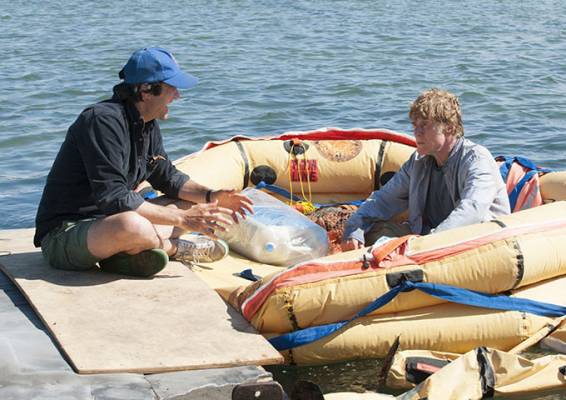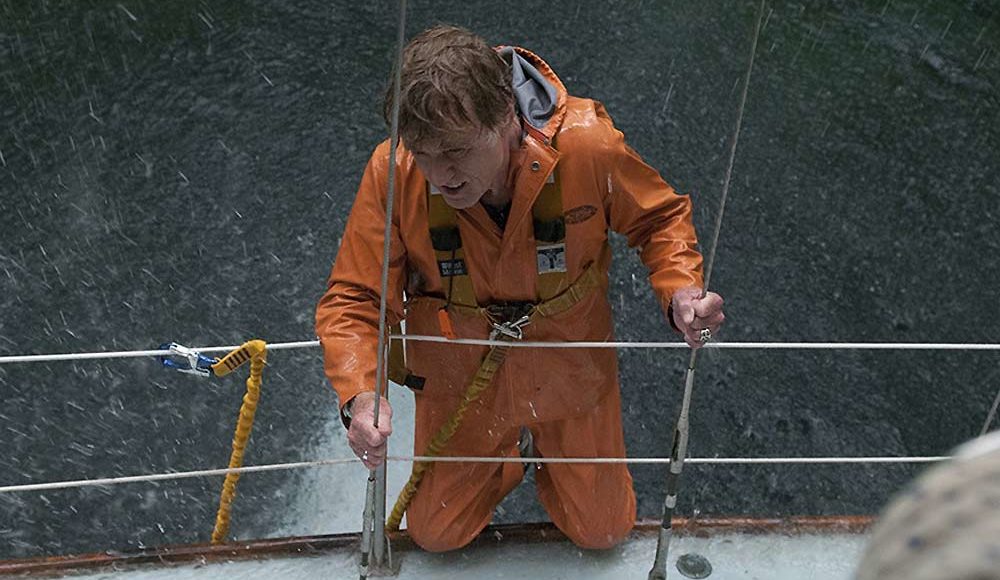The film opens with a laconic, heart rendering simple and sincere shriving, “I’m sorry. I know that means little at this point, but I am.” The voice, so familiar, so close to anyone who has ever set foot in a picture show or spent time with TV within spitting distance, the voice so American reels ruggedly on, “I tried. I think you would all agree that I tried. To be true, to be strong, to be kind, to love, to be right, but I wasn’t. All is lost.”
Now there can be no doubt as to the final scene’s disclosure.
As the flotsam and jetsam of a ruined sailing craft floats before the camera we are assured by a voice stripped of bravado, but untainted by trepidation, “I fought to the end. I’m not sure what that’s worth. But know that I did.”
 Chandor directs Redford (Photo by Richard Foreman, Jr. – Courtesy of Lionsgate)It is a fitting epithet for a man.
Chandor directs Redford (Photo by Richard Foreman, Jr. – Courtesy of Lionsgate)It is a fitting epithet for a man.
It would be for a nation.
Or a species.
I am unacquainted with writerdirector J.C. Chandor’s 2011 financial drama Margin Call, but after All is Lost I plan to address that lapse on my part, and I am looking forward to his upcoming A Most Violent Year.
For I am a sucker for film makers who see the media in mythic terms, and All is Lost does that.
Working from a shooting script only 31 pages long, Chandor has come near to producing a work of pure cinema. Aside from the opening monologue there is scant little dialogue, and a narrative frame nearly as sparse.
Man is a creature enveloped in isolation from the moment he is banished from the warm, dark security of the womb to ride into the terror that will become his life. Sadly, the poet is wrong, every man is an island.
Our hero Everyman (Robert Redford), a man in a vessel of wood and cloth, bobbing in a vast, unconcerned, empty sea, exemplifies that Isolation.
He is awakened abruptly in his bunk by a violent collision. Water floods his cabin. Racing topside he discovers that in the limitless expanse that is the Pacific, he has impacted with a huge metal shipping container which has mortally pierced the hull of his craft.
He will sink.
Here we have the stage set for a theomachal tale of man versus…what? God, fate, destiny, existence? You fill in the blank.
In “The Old Man and the Sea” Hemmingway’s prize was “the beautiful fish.” In All is Lost the prize is life. In a way, Chandor’s tale of a man’s reaching his Pax in Bello with life is absurd, since our battle with life is to the death.
As a man who is aware of his time here, and as a man who is no stranger to “fighting the good fight,” it makes perfect sense to see why Redford would be drawn to this project.
The film is both stark and relentless, but by the end we realize that Redford’s opening monologue was not a Viaticum but a benediction for the character of the man he portrays as well as the character of Man.
It is as watching, a form sinking back down into the sea’s dark liquid embrace, that rising from somewhere deep within their own self one will perhaps feel the cry of Hallelujah. Not for some “god” but for humanity.
Spoiler alert:
Taking notice of the name on the container which begins the film announces the lesson to be learned.
All is Lost, available in DVD and Blu-ray.
Writer/Director: J.C. Chandor
Starring: Robert Redford
Rated: PG-13
Released: 2013




